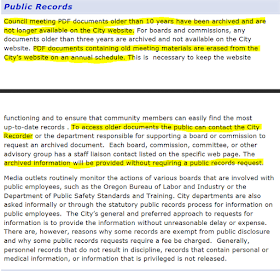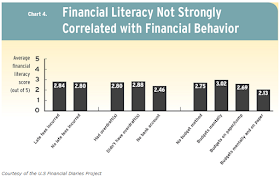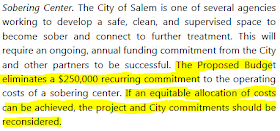By Sarah Owens and Michael Livingston
Since 2017, when one of the City's strategic plan work groups advised the City Council to support the (re) formation of a local Continuum of Care (CoC), the problems within the 28-county Rural Oregon Continuum of Care (ROCC) have just continued to grow.
A CoC is the primary planning and coordinating body that's supposed to oversee the delivery of
all area homeless housing and services.
For many years, Salem, Marion and Polk Counties had their own CoC. But, in July 2011, a decision was made to merge with the ROCC. See "
The 2011 Decision to Merge." Jimmy Jones, Executive Director of the Mid Willamette Valley Community Action Agency (MWVCAA) now says that decision was "a mistake." See "
News from the Continuum" (5 March 2019) and "
ROCC: Leave or Remain?"
 |
| Typical ROCC video-conferenced board mtg |
As Jones explained in a
recent interview, he has known since 2016 that there were problems with ROCC governance. That was the year he arrived in Salem from Clark County, Washington, to work for MWVCAA as a Coordinated Entry Specialist.
In that capacity, Jones spent many months traveling and training throughout the ROCC, trying to help the member agencies of ROCC "up their game." He continued those efforts after March 2017, when he was promoted to run MWVCAA's Community Resources Program, which includes The ARCHES Project. But, today, after nearly three years of trying, he is ready to throw in the towel.
The "proximate cause" of Jones's decision to give up on ROCC was losing funding for a long-running, successful, rapid rehousing (RRH) project. He attributes the loss primarily to ROCC's poor governance.
ROCC is an unincorporated association. It's governed by a board of directors that is advised by a paid "Project Coordinator" who supposedly is supervised by Community Action Partners of Oregon (CAPO). Every year, HUD allocates about $3.2M to the ROCC. Member agencies then compete for those funds through a grant process that involves listing all projects in order of priority according to set criteria.
 |
| ROCC's 2018 "Priority Listing" |
In 2018, ROCC ranked MWVCAA's RRH project 32 out of 32, all but guaranteeing it would not be funded. And, it wasn't. MWVCAA's RRH project will end on June 30, 2019.
In the
interview, Jones acknowledges that the RRH project might have lost points due to HUD's preference for permanent supportive housing projects. (In recent years, HUD has begun prioritizing permanent supportive housing over rapid rehousing.) Even so, he says, our area has a demonstrable need for rapid rehousing, a fact that should have been weighed in mitigation.
The primary problem, Jones says, is that ROCC essentially has turned a blind eye when programs disregard HUD guidelines and cherry-pick lower-needs clients. Programs like his, which serve higher needs clients per HUD guidelines, are disadvantaged when competing against those that cherry-pick.
Another big problem is that ROCC, he believes, has been ranking projects so that funds are redistributed regionally, which is to say, evenly across its geographic area, contrary to HUD guidelines. That practice disadvantages areas like Salem, where need is concentrated.
The 2018 competition finally convinced Jones that ROCC's practice of regional redistribution and tolerance of cherry-picking are unlikely to change. He firmly believes that, in order for Salem and Marion and Polk Counties to make substantial progress ending homelessness, it will be necessary to re-form the local CoC, so that, when HUD decides not to fund a project like his RRH, the money will go to another provider in the area -- like Northwest Human Services, or Family Promise. It doesn't end up in, say, Lincoln or Baker County.
Jones's support for re-formation of a local CoC is a huge problem for ROCC, given it's only been inertia, uncertainty, fear, avoidance, timing, politics and more politics that have kept Salem and Marion and Polk Counties in the ROCC in the first place.
Jones's support builds on support for re-formation that existed in 2017. The Mid Willamette Homeless Initiative Task Force (MWHITF) identified it as a worthy pursuit in its Strategic Plan, and, as mentioned above, Salem's Affordable Housing, Social Services and Homelessness Task Force had also
recommended pursuing it. So did a significant number of community partners. See "
May 2017 Outreach Report."
 |
| Reeves in 2017 |
|
There were also countervailing forces. Conflict between county electeds over MWHITF proceedings (see "
MWHITF: Growing Conflict"), the refusal of MWVCAA's then-executive director, Jon Reeves, to take a stand (see "
Reeves Letter re ROCC"), and ROCC's covert efforts in opposition (see "
HUD Seeks to Ease Tensions Within the ROCC", among other factors and circumstances. However, since then, Reeves has resigned from MWVCAA, there are new faces on the boards of county commissions, and ROCC has even bigger problems to deal with than trying to keep Salem and Marion and Polk Counties from leaving.
In 2018, around the time that Reeves resigned, the Oregon legislature was putting pressure on the Oregon Housing and Community Services (OHCS) Department to confront problems with how Oregon's community action agencies deliver homeless services. See, "
State Seeks Accountability from Homeless Services Providers." That legislative mandate put CAPO's administration and ROCC's governance issues on OHCS's radar.
 |
| Zimmer in 2017 |
In recent months, CAPO has reportedly taken a more active role in ROCC administration. ROCC's Homeless Management Information System (HMIS) "lead" and long-time Project Coordinator, Jo Ann Zimmer, both have retired, or otherwise been replaced. These are positive developments, but substantial improvements in ROCC's governance and "check the box" culture will require considerable time, effort and resources. If Salem and Marion and Polk Counties are serious about ending homelessness, they must not continue to wait and hope for something that may never happen.
On March 12, the vice-chair of ROCC's Board of Directors notified select members that she, or someone, had registered ROCC with HUD, thereby locking Salem and Marion and Polk Counties into ROCC membership for yet another year. Unless action is taken soon on the re-formation, this process will repeat itself in March 2020.
ROCC did not respond to a request to comment on Jimmy Jones's interview.
3/27/19 Update: In the mean time, ROCC scored well below the national median for 2018.
Clackamas County, Oregon, received a score of 190, the highest score of any CoC in the U.S.




































